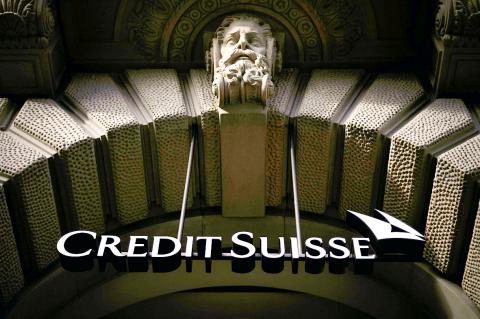Swiss bank Credit Suisse agreed on Friday to pay US$885 million to settle US charges it sold shoddy mortgage bonds to Fannie Mae and Freddie Mac ahead of the financial crisis.
Credit Suisse will pay about US$651 million to Fannie and US$234 million to Freddie, said the US Federal Housing Finance Agency (FHFA), the conservator of the two companies rescued by government during the 2008 financial crisis.
The FHFA said the settlement resolves all of its claims in two lawsuits against Credit Suisse.

Photo: AFP
The claims alleged that Credit Suisse misrepresented the quality of billions of dollars of mortgage-backed securities it sold to Freddie and Fannie during 2005 to 2007.
Credit Suisse agreed to the settlement while still “vigorously” denying the allegations in both cases.
The agency said the bank’s documentation for the securities contained misstatements and omissions of material facts concerning the quality of the underlying mortgage loans, the creditworthiness of the borrowers and the practices used to originate such loans.
During the years-long housing bubble, banks’ loose lending practices extended subprime mortgages to borrowers with patchy credit and at-risk finances. Those borrowers began to default on the loans, spurring the subprime crisis that collapsed the bubble and led to the 2008 financial crisis.
“As a result of defendants’ misstatements and omissions of material fact, Fannie Mae and Freddie Mac have suffered substantial losses as the value of their holdings has significantly deteriorated,” the suit said.
The FHFA was created in 2008 to oversee the government’s conservatorship of Fannie and Freddie, which back most of the mortgages financed in the US.
The settlement marks the latest big government settlement with a US banking giant in the aftermath of the housing bust.
Since the beginning of the year, the FHFA has announced US$2.26 billion in settlements, including the latest with Credit Suisse.
Wall Street bank Morgan Stanley paid US$1.25 billion and French bank Societe Generale paid US$122 million last month.
For all of last year, the FHFA recovered nearly US$8 billion on behalf of taxpayers through such settlements.
FHFA sued 18 financial institutions in 2011 alleging securities law violations, and in some cases, fraud, in relation to their marketing of mortgage-backed securities.
Credit Suisse on Friday said it would take an after-tax charge of 275 million Swiss francs (US$311.6 million) on its financial results last year.
“This agreement resolves Credit Suisse’s largest mortgage-related investor litigation,” the Zurich-based bank said in a statement.
Credit Suisse is also one of 14 Swiss banks under US investigation for allegedly accepting tens of billions of undeclared dollars from US citizens trying to avoid taxes.
A former banker of Credit Suisse pleaded guilty on March 12 to the charge.
Andreas Bachmann, a Swiss citizen, admitted that between 1994 and 2006, he engaged in a “wide-ranging” conspiracy to defraud US tax officials, the US Department of Justice said.

Sweeping policy changes under US Secretary of Health and Human Services Robert F. Kennedy Jr are having a chilling effect on vaccine makers as anti-vaccine rhetoric has turned into concrete changes in inoculation schedules and recommendations, investors and executives said. The administration of US President Donald Trump has in the past year upended vaccine recommendations, with the country last month ending its longstanding guidance that all children receive inoculations against flu, hepatitis A and other diseases. The unprecedented changes have led to diminished vaccine usage, hurt the investment case for some biotechs, and created a drag that would likely dent revenues and

Global semiconductor stocks advanced yesterday, as comments by Nvidia Corp chief executive officer Jensen Huang (黃仁勳) at Davos, Switzerland, helped reinforce investor enthusiasm for artificial intelligence (AI). Samsung Electronics Co gained as much as 5 percent to an all-time high, helping drive South Korea’s benchmark KOSPI above 5,000 for the first time. That came after the Philadelphia Semiconductor Index rose more than 3 percent to a fresh record on Wednesday, with a boost from Nvidia. The gains came amid broad risk-on trade after US President Donald Trump withdrew his threat of tariffs on some European nations over backing for Greenland. Huang further

CULPRITS: Factors that affected the slip included falling global crude oil prices, wait-and-see consumer attitudes due to US tariffs and a different Lunar New Year holiday schedule Taiwan’s retail sales ended a nine-year growth streak last year, slipping 0.2 percent from a year earlier as uncertainty over US tariff policies affected demand for durable goods, data released on Friday by the Ministry of Economic Affairs showed. Last year’s retail sales totaled NT$4.84 trillion (US$153.27 billion), down about NT$9.5 billion, or 0.2 percent, from 2024. Despite the decline, the figure was still the second-highest annual sales total on record. Ministry statistics department deputy head Chen Yu-fang (陳玉芳) said sales of cars, motorcycles and related products, which accounted for 17.4 percent of total retail rales last year, fell NT$68.1 billion, or

HSBC Bank Taiwan Ltd (匯豐台灣商銀) and the Taiwan High Prosecutors Office recently signed a memorandum of understanding (MOU) to enhance cooperation on the suspicious transaction analysis mechanism. This landmark agreement makes HSBC the first foreign bank in Taiwan to establish such a partnership with the High Prosecutors Office, underscoring its commitment to active anti-fraud initiatives, financial inclusion, and the “Treating Customers Fairly” principle. Through this deep public-private collaboration, both parties aim to co-create a secure financial ecosystem via early warning detection and precise fraud prevention technologies. At the signing ceremony, HSBC Taiwan CEO and head of banking Adam Chen (陳志堅)